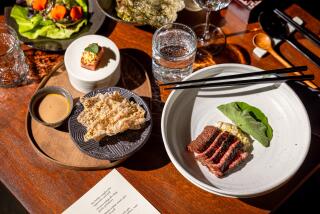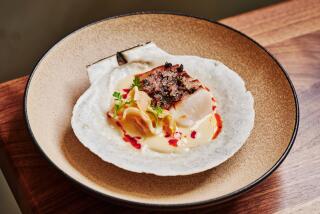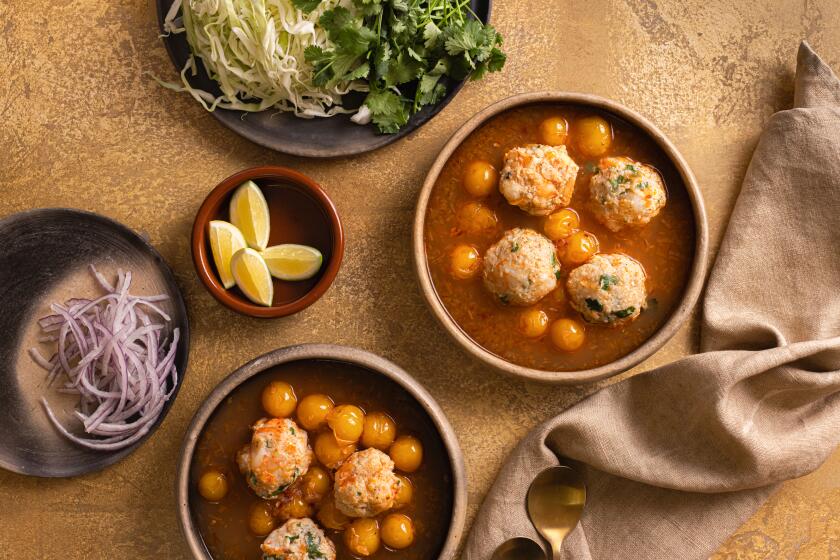What would a game-changing L.A. vegetarian restaurant look like?
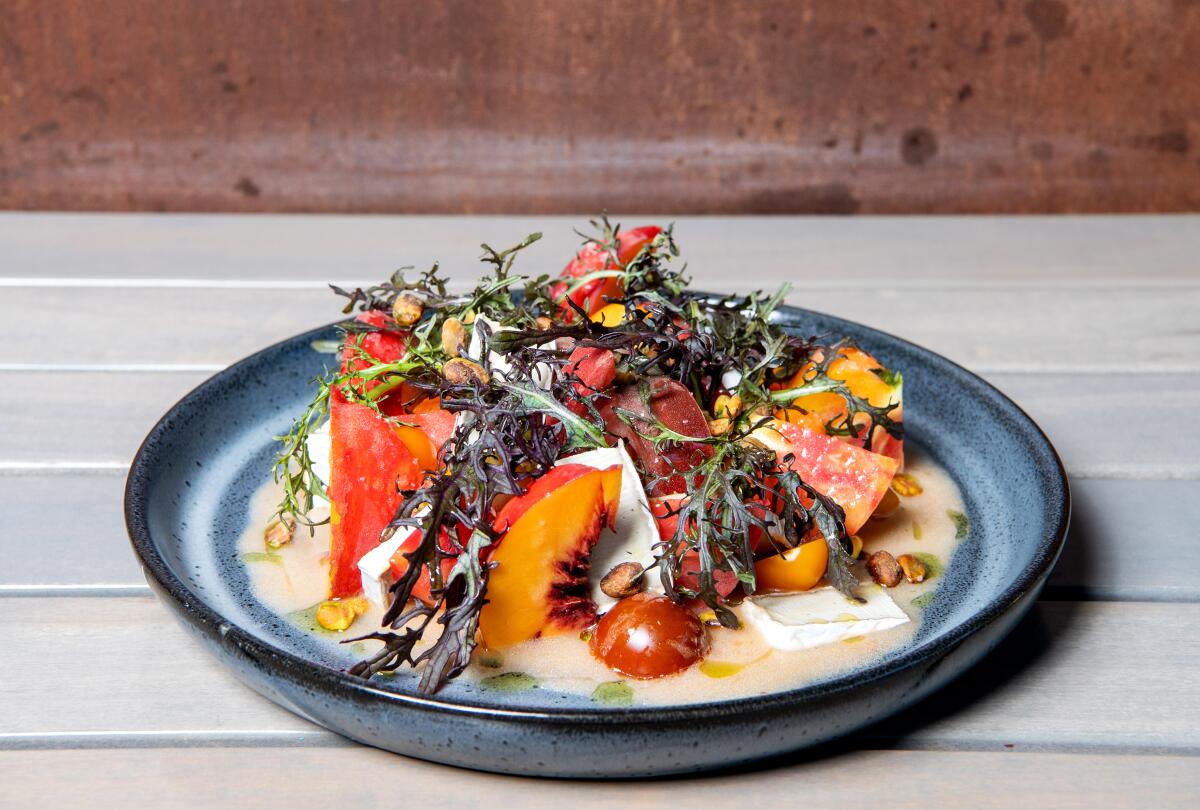
My first meal ever in Los Angeles was dinner at Campanile in 1997; for breakfast the next morning I went straight back for pastries from adjoining La Brea Bakery. Mark Peel and Nancy Silverton were the omnipresent power couple in the food world back then, and as a 24-year-old pastry cook I’d saved the money to eat at their restaurants.
I was also a vegetarian at the time, so after a breakfast of Silverton’s peach crisp and croissants, my friend Kazzie suggested lunch at Real Food Daily, a vegan restaurant in Santa Monica that had opened in 1993. I don’t remember what I ate there — it probably involved quinoa, the cornerstone of my meat-free diet — but I remember expecting to be dazzled by seasonal Southern California produce. Instead the menu involved a familiar, safe mix of salads, sandwiches, wraps and pastas. I worked in the business so I grasped the restaurant’s position: Organic ingredients were (and remain) a priority, but so did appealing to the widest possible audience.
These memories surfaced while I was writing a review of Nic’s on Beverly, published this week. Nic’s is vegan, and while some of its ideas reflect current trends — a globalized menu that leaps from tacos to Detroit-style pizza to tagine — it basically follows the entrenched model of benign, ubiquitous appeal.
I’m betting its safe approach has as much to do with the perceptions of the marketplace as it does with the talent in the kitchen. Meat-free restaurants are still a niche frontier in the American dining ecology. For many omnivores, eating at a vegetarian or vegan restaurant engenders fear about “lack,” in the many ways that word can be interpreted. And of course more meat-serving restaurants than ever also serve thoughtful, artistic salads and plant-based options. That reality doesn’t at all replace the pleasure of having an entire menu available for those who don’t consume animal flesh — but it does raise the bar for vegan and vegetarian chefs to create food that satisfies on the same intellectual and creative levels as chefs who cook meat.
I strayed from vegetarianism not long after that first trip to Los Angeles, but when I’m off the clock as a critic I lean meat-free. While I can’t say that I’ve surveyed the full scope of dedicated vegetarian and vegan restaurants in the metro area, I’m pretty confident I’ve got the gist; Crossroads Kitchen in Beverly Grove has most impressed me.
But I hold out hope for a meat-free restaurant run by a chef with the skills, ambition and culinary charisma to break through the established structure — to surprise the city (and thus the country) with its innovation and flat-out deliciousness. What would a groundbreaking meat-free restaurant look like in L.A.? Would it look something like Jessica Koslow’s Sqirl? Think about Koslow’s famed sorrel rice bowl and its insane layering of ingredients: brown rice coated in sorrel pesto, preserved Meyer lemon, lacto-fermented hot sauce, radishes, feta, poached egg, the optional fan of avocado. It’s a vegetarian rhapsody that can easily be made vegan.
Can’t another nimble mind come up with similarly irresistible dishes in an entirely animal-free framework? Can there be a sustainable template for a restaurant that challenges our limited thinking around vegetable cooking and wallows in the glory of our farmers markets yet still finds its broad audience?
I have a running wish list for restaurants I’d love to see exist in L.A., and a cutting-edge meat-free disruptor is at the top of it.
ASK THE CRITICS
How does one become a food critic?
—@paulinetai, via Instagram
Work as hard — maybe harder — on being an excellent writer as you do on being an informed eater.
Read all kinds of outstanding writers, and study the form of restaurant criticism. I did not simply fall into this line of work. When I decided in 2001 I wanted to become a food critic, I printed out a binder full of restaurant reviews and read the enduring masters over and over again: Ruth Reichl, Alison Cook, Jonathan Gold, Gael Greene, Tom Sietsema. I scrutinized how tones and voices changed between alt newsweeklies (which barely exist anymore), daily newspapers, magazines and online reviews.
Follow your obsessions. I cover every kind of restaurant, but over the years readers have picked up on my exhilaration when I write (or post on Instagram) about topics that particularly resonate with me: crab, pie, calzones, pastries, the foods of Lebanon and India, the cuisines of the American South, the ways that food and spirituality intertwine, tea.
Be willing, as you break into the field, to write other things besides restaurant reviews. It’s a disappearing niche; fewer and fewer of us have the privilege of making a living at it.
Speaking of privilege: Constantly challenge yourself to confront your own preconceptions around food cultures, and be aware of the relationship you have with eating familiar and unfamiliar foods. Defy your own comfort zones. Discipline yourself to go into every restaurant with an open and curious mind.
Find the story in the restaurant. Merely reciting a list of dishes you liked and didn’t like is boring.
Know that your body will belong to the job, that you’ll live out your life in restaurants and that no one you know will ever, ever want to hear you complain about these things — and they’ll probably have a valid point.
TOP STORIES
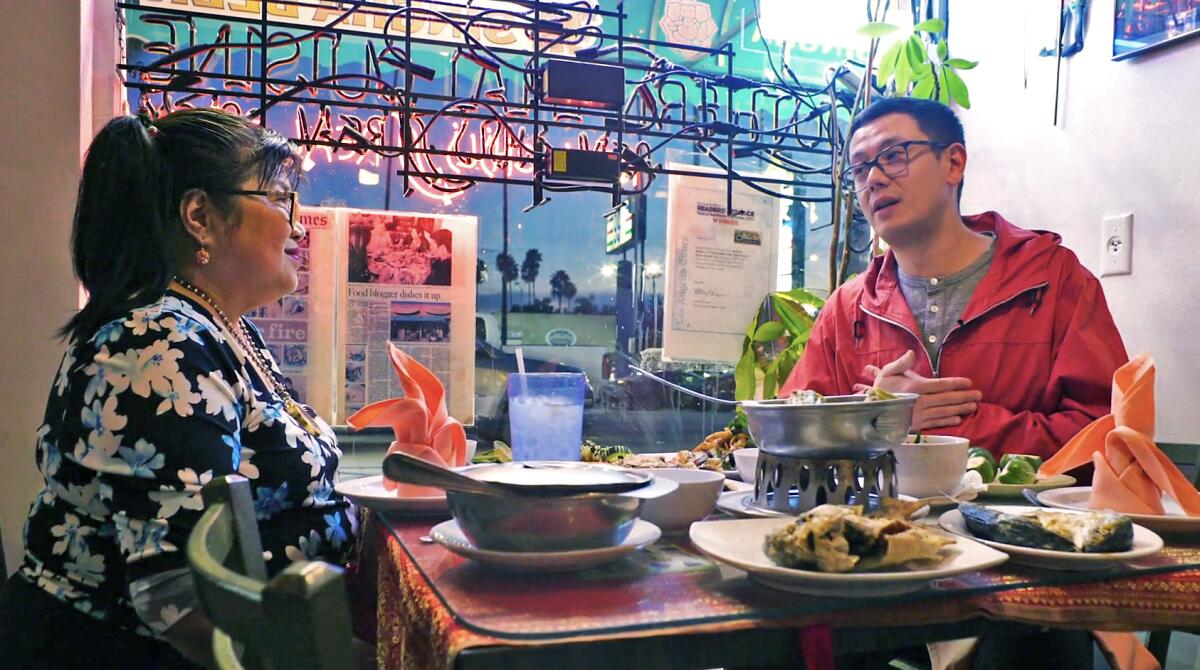
- In the inaugural episode of“Off Menu,” host Lucas Kwan Peterson and Jitlada owner Jazz Singsanong visit megastore LAX-C, nicknamed “Thai Costco.”
- On that note, Genevieve Ko put together a list of some fast, easy Thai recipes: Hello, sticky rice with mango.
- In an article commissioned with the Southern Foodways Alliance, Hanna Raskin goes deep on the high costs for chefs when they participate in food festivals.
- This week Patricia Escárcega reviews Brodard in Orange County: Read on about excellent nem nuong cuon — grilled Vietnamese pork spring rolls — and some fantastic pastries.
- Some restaurant news: A third Jon and Vinny’s will open in South L.A., and Travis Lett looks to be leaving popular Venice restaurants Gjusta and Gjelina.
Lastly, a must-read from staff writer Victoria Kim about Christian Morales, a South Korean-born chef re-creating the flavors of East L.A., where he grew up, since being deported to Seoul 17 years ago.
More to Read
Eat your way across L.A.
Get our weekly Tasting Notes newsletter for reviews, news and more.
You may occasionally receive promotional content from the Los Angeles Times.

